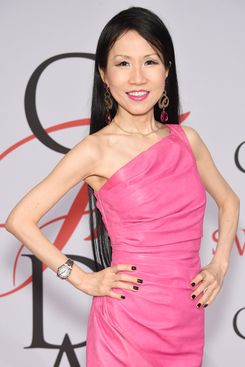
On a cool, clear evening last week, Chiu-Ti Jansen, a writer and socialite and the founder of the Chinese lifestyle consultancy China Happenings, threw a belated Valentine’s Day party for real-estate investors and their advisers. Jansen’s company provides marketing and PR services to high-end brands looking to attract wealthy Chinese shoppers. Fendi, Van Cleef & Arpels, and the developers of the Baccarat Residences condominium are among her previous clients, and tonight, Jansen would be trying to sell investors on 252 East 57th Street — a Skidmore, Owings & Merrill–designed condo and the smallest of the glassy midtown towers known collectively as Billionaire’s Row.
Demand on that rarified strip has lately been tepid. And so Jansen’s co-hosts for the evening — the building’s co-developers, the World Wide Group and Rose Associates — hoped that the party could help acquaint potential buyers with the condo’s charms. Since the building is still under construction, a fourth-floor office suite on Third Avenue had been staged to resemble one of 252 East 57th’s 55th-floor condos. After the cocktail hour, Jansen had arranged for an expert speaker to hold forth on the party’s theme: 2016 Hot Feng Shui Tips for Your Real Estate Investments & Love Life.
In a Miele-equipped kitchen, Bryce Shuman, the executive chef at Betony, prepared “feng shui–inspired” hors d’oeuvres to be passed on silver trays: Chong Ching Crunch; marshmallow with green-tea powder; crispy chicken skin. Waiters in black poured Riesling, prosecco, and sparkling water for an effortfully stylish crowd speaking a mix of Mandarin and English. Among the attendees were Niko Elmaleh, an owner of the World Wide Group, and the architect Chien Chung Pei, a son of the legendary I.M. Pei. Beyond the softly lit entryway, in a small, rectangular room carpeted royally in maroon, a cardboard model of 252 East 57th Street rose above the heads of passersby from a circular pedestal. Jansen greeted guests there, dressed in quilted shorts, a flowing pullover, and perilous heels — all Valentine red.
A onetime corporate lawyer, Jansen is now something of a media polymath. In recent years, she has hosted awards shows on Fashion TV, blogged for the Sotheby’s website, and contributed a column to the Chinese edition of Financial Times. From 2011 to 2015, she edited Yue magazine, a luxury quarterly that she co-owned with the real-estate developer and New York Observer publisher Jared Kushner. Since the magazine’s closure last year, she has focused her energies on uniting her monied Chinese contacts with the merchants that would like to make them clients.

There have lately been signs, however, that the network of “affluent Chinese and Chinese-American influencers” on which Jansen relies might be becoming somewhat less influential.
Late last year, in an effort to keep resources at home, the Chinese government began more vigilant enforcement of a law forbidding the transfer abroad of more than $50,000 per person annually, circumvention of which had previously been semi-tolerated. Another popular method of moving money overseas, involving the conversion to cash of large insurance policies, was targeted by a similar crackdown. These and other pressures at home have had an outsize impact on the global luxury market. In a gloomy report on the Swiss watch industry published last year by Deloitte, 81 percent of the executives surveyed indicated that Chinese demand for their wares had fallen in the last 12 months due to anti-corruption legislation. Louis Vuitton has been hurting, too.
Last month, the Times reported a rash of multi-million-dollar price cuts in luxury Manhattan real-estate listings, including at 252 East 57th Street. Of course, those discounts can’t be attributed solely to waning Chinese investment, but they suggest a significant contraction in an area of the market that foreign capital — particularly from China — has played an outsize role in shaping. According to a report published last year by the National Association of Realtors, Chinese buyers accounted for $28.6 billion in U.S. sales over the previous 12 months, more than twice the amount spent by any other foreign group. Purchases in New York, Los Angeles, and other major cities account for much of that spending.
Daniel Chang, a broker with Sotheby’s International Realty who heads one of his firm’s Asia desks, estimates that 50 to 60 percent of his clients are Chinese. In recent years, he’s helped sell them units at 30 Park Place, a Tribeca condo designed by Robert A.M. Stern, where a duplex is currently available for $29.5 million; the Baccarat Residences, an ultra-modern building across the street from MOMA; and One57, arguably the city’s fanciest address. Not long ago, appetites for these Manhattan trophy properties among wealthy Chinese seemed insatiable. “It was about buying big and buying bold,” Chang said. “They didn’t care about the price.” In the last two years, though, just as some of these same buildings were being completed, interest began to wane. Chang attributes cooling passions to oversupply at the top of the market, combined with tightened regulations at home. Among the projects seemingly affected by this confluence is the still-under-construction 220 Central Park South, a limestone-clad skyscraper rumored to have a $175 million penthouse in the works. “They are calling us every day now,” Chang said. “Asking us if we have wealthy customers who are wanting to buy.”
Making matters potentially worse for luxury developers was a recent announcement by the federal government that beginning in March, the identities of buyers involved in pricey purchases made in cash, or with the use of a shell company, must be reported to the Treasury Department. (Shell companies, mostly LLCs, have increasingly become part and parcel of the luxury real-estate trade — often because of innocent concerns about privacy, other times to cloak ill-gotten gains.) The new program, which is slated to run until August, will affect residential Manhattan transactions worth $3 million or more, and purchases in Miami-Dade County of $1 million and up. If Treasury officials identify a lot of suspicious activity during that interval, according to the Times, “they will develop permanent reporting requirements across the country.”
Marc Landis, who chairs the real-estate practice at the law firm of Phillips Nizer LLP, envisions several likely effects. “People who have legitimate needs for privacy but are concerned that their information may not be secure may back away from investing,” he said recently. “Money launderers, I suspect, will fall into two categories. Some will back away from the market, and others will simply lie. Someone who has gotten whatever they have through bad acts — I suspect a lot of the time, that kind of a person will find a second cousin once removed to appear on the paperwork.”
Much of the investment from China that helped fuel luxury development in New York falls into yet another category — a “gray area,” in Chang’s estimation. It is true that many of those who got rich in China’s boom did so, in one way or another, through connections to government officials, and that by Western standards, their business practices might not have been exactly clean. At the time, though, the boundaries of legality were often blurry. Chinese investors eager to secure condos at One57 and the like have generally been more concerned with protecting their profits from a volatile economy — and from anti-corruption prosecutions that can be arbitrary, motivated more by personal animus than justice — than with cleaning their cash. “The U.S. is the biggest recipient of flight capital in the world,” said Ed Wilson, a former deputy general counsel to the Treasury. “A lot of it is legitimately made. It may be tax evasion where they’re from, it may be illegal exportation of capital. What is it here? It’s investment.”
Both Chang and Landis doubt that their clients will abandon deals as a result of the new Treasury regulations. “But there are undoubtedly people who won’t feel the same way,” Landis said. “I think developers are a little bit concerned. For the super luxury stuff that’s been softening in the last few months, knowing that that’s such a small world to begin with, it’s concerning that some of those potential buyers are being taken out.”
As the faux condo filled up, Pamela D’Arc, the director of sales for 252 East 57th Street, seemed cautiously optimistic. She acknowledged, though, that the developers had resorted to promotions that wouldn’t have been necessary five years ago. Prices, particularly of units asking more than $10 million, had fallen. Brokers had been offered a commission within 60 days of a signed contract — payable even if the contract didn’t ultimately close. On the bright side, D’Arc noted, interested parties had told her that the building had good feng shui.
An announcement was made indicating that a presentation by the feng shui master Zhi Hai was about to begin, and in the living room, young women with long black hair cozied on cream-colored furniture arranged around an oversize coffee table. A handful of men in suits occupied standing room. Chiu-Ti Jansen and Hai, a petite woman in a bright red jacket — whose business card also touts her status as a metaphysics master and architect — took low chairs facing the crowd. Waiters freshened drinks. Backlit drone captures set behind windows of curved glass provided the crowd with fake but convincing vistas encompassing Central Park and the East River. (Proximity to water and greenery is a frequent selling point among the feng shui faithful.)
Alternating between Mandarin and English, Jansen and Hai reviewed changes to the feng shui order for 2016, the Year of the Monkey, emphasizing the ancient practice’s practical applications to the timeless pursuits of love, money, power, and property. The inauspicious — i.e., northeastern — orientation of an apartment might be neutralized, Hai said, using plants and jarred water. Good energy could be accentuated with the right colors, and the results might make you rich in more than spirit: “If feng shui in your house is good, you can just increase the price — buyers will sense your prosperity. It’s so easy to sell!” The discipline could also be deployed as an evasive tactic. “I’ve helped so many people win lawsuits,” said the master, drawing a chuckle from a bespectacled man, who nodded knowingly.
As the lecture transitioned to a Q&A, the crowd began to disperse. A woman in a sleeveless dress and a blue fur Russian hat with matching vest flitted through the entryway. “This is fox,” she explained, heading onto the elevator. “Poor fox!” Elmaleh, of the World Wide Group, followed some minutes later, joined by Chien Chung Pei. “Are you doing good traffic?” the architect asked, referring to demand at 252 East 57th Street. “We’ve had good traffic,” Elmaleh said after a pause. “We’ve got a great location.” Pei nodded, seeming to consider the matter closed. “And you can’t miss the sales office,” Elmaleh continued. “We haven’t even done much advertising. We haven’t done a full-page spread in the Times, nothing like that.” They had reached the ground floor, and Pei moved toward the coat check. Elmaleh walked after him. “We’re really only starting to advertise now,” he insisted. “We’re booming along.”





























